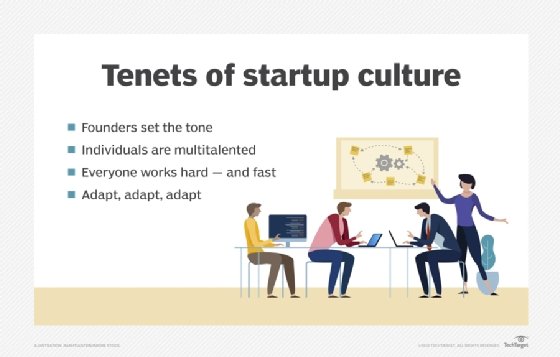What is a startup company?
A startup company is a newly formed business with particular momentum behind it based on perceived demand for its product or service. A startup intends to grow rapidly as a result of offering something that addresses a particular market gap.
There are no fixed parameters on what type of company can be considered a startup, but the term most frequently applies to high-tech companies creating products that leverage technology to offer something new or to perform an existing task in a novel way. Many startup companies don't have products for sale, and many do not have a revenue stream.
Similarly, there are no firm rules on when a startup ceases to be considered a startup. Some experts suggest a startup stops being one when it hits a certain size, completes its path to profitability, receives a high level of investment funds, becomes a public company or is acquired by a larger corporation.
Startup funding
The genesis for startups is often the founder's concept for a product. Some originate once the founder has hit the subsequent step, at the proof of concept stage.
The startup's founder often leads the development of the product and serves as the organization's business leader. They often focus on scaling the company ahead of making a profit. Facebook did not make a profit until 2009, five years after Mark Zuckerberg founded the company while he was a student at Harvard University.

As a result, the value assigned to a startup does not necessarily correspond with the actual revenue it generates during those early years. Instead, company leaders and investors might consider the company's potential value based on the profits it's projected to generate. Startups that have a value of $1 billion or more are called unicorns.
Some founders bootstrap their young companies using their financial assets -- whether owned or borrowed -- to fund the company's day-to-day operations. Others turn to angel investors when starting, and later to venture capitalists.
Many startups work in incubators -- workspaces and offices that are financially supported by nonprofit or government organizations, as well as other institutions committed to growing these kinds of businesses. As such, these supporting entities frequently provide seasoned business leaders and successful entrepreneurs to mentor startup leaders.
Startup investors, along with the founders and other leaders within startups, often recoup their investments when they sell their startups to larger, more established companies; that's one exit strategy. Another strategy entails taking startups public. Startups can also opt to stay private, using their accumulated profits to reinvest in the enterprise and provide pay to the founders and employees.
Startup organizational structure
The term startup rose in popularity during the 1990s, as the number of technology and internet-related companies rapidly increased. Excitement over their potential led to the dot-com bubble, with investors who were eager to capitalize on the growing popularity of the internet overvaluing startups. This was the dot-com boom.
When too many of these companies failed because they lacked solid business fundamentals, including viable products, it left investors unable to recoup their investments -- a comedown that's sometimes called the dot-com bust. Most startups today spend more time analyzing their financial statements to guard against that situation.
Unique characteristics of startups
Not all new companies are considered startups. Companies that have limited growth potential in terms of their customer base, revenue and product aren't seen as startups. For instance, a new restaurant, dry cleaner or professional services firm isn't likely to be called a startup.
Although there's no single standard for what defines a startup company, the business community recognizes that there is a special class of young companies and a particular work culture that exists within startups.
This startup culture, or startup mindset, features several key characteristics, including a commitment to innovation, and a willingness to take risks and make decisions quickly. This atmosphere attracts potential workers who seek out that environment.
The startup culture can also be considered egalitarian, with workers at all levels pulling together. Their workspace frequently reinforces that view, with open areas where leaders and staffers work side by side. However, founders and their chosen executives do remain in charge and often serve as ambassadors for the product and company they're building.

Perceptions of startups
Startups are often heralded for their potential to shake up industries through what's called disruptive innovation and introduce new processes and products to the market, as well as for their innovative culture. They can have an almost mythical hold on the American imagination, as they embody the notion that anyone can start with an idea, work hard and become rich while shaking up the status quo.
However, startups are also prone to negative qualities, including hypercompetitiveness, impulsivity and exclusionary behaviors that shut out workers, partners and other potential stakeholders who don't meet certain narrow standards set by core members of the startup. Furthermore, the high failure rate of startups is often highlighted, with many failing to achieve sustainable growth or profitability.
Ultimately, startups have high growth potential and play a crucial role in driving economic growth and technological advancements. However, understanding the dynamics, challenges and opportunities associated with startups is essential for entrepreneurs, investors and stakeholders involved in the startup ecosystem to be successful.
Explore the differences between a startup culture and an established company's work environment.







